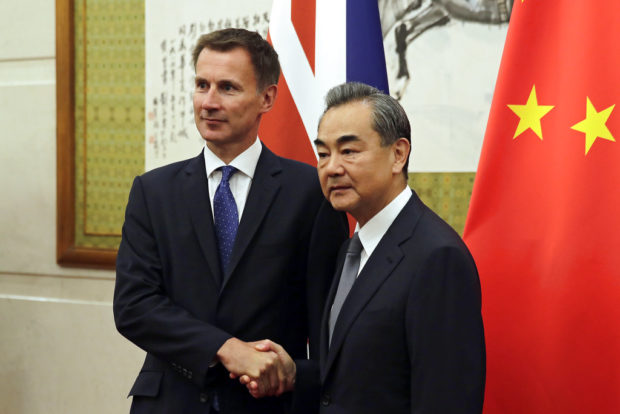China says still committed to Hong Kong semi-autonomy

Britain’s Foreign Minister Jeremy Hunt (left) shakes hands with his Chinese counterpart Wang Yi as they pose for a photograph before their meeting at the Diaoyutai State Guesthouse in Beijing on July 30, 2018. AP
BEIJING — China’s foreign minister said Monday that his country remains committed to the “one country, two systems” governing framework in Hong Kong, despite growing concerns that Beijing is eroding the former British colony’s civil liberties.
Wang Yi told reporters following talks with his British counterpart, Jeremy Hunt, that China would continue to follow the system put in place when the city was turned over to Chinese rule in 1997.
“Hong Kong affairs are the domestic affairs of China. We do not welcome nor do we accept other countries to interfere in China’s domestic affairs,” Wang said at a joint news conference.
“But of course China will continue to support and will stay committed to one country, two systems,” Wang said.
Beijing promised to let Hong Kong maintain wide autonomy and civil liberties for 50 years, but fears are growing that China’s communist leaders are backtracking by oppressing the political opposition.
Article continues after this advertisementWhile the financial center remains among the highest-rated for rule of law and government efficiency, freedom of speech is seen as coming under attack. The government has also moved against a generation of young political activists who emerged after 2014’s failed nonviolent protests over Beijing’s decision to restrict elections.
Article continues after this advertisementChinese President Xi Jinping warned in a speech last year marking 20 years since Hong Kong became a semi-autonomous region of China that any activities in the city seen as threatening China’s sovereignty and stability would be “absolutely impermissible.”
Accompanying that hard line, China has angrily denounced critical reports about the implementation of one country, two systems from Britain, with which it signed a joint agreement on post-1997 arrangements, and other nations.
Hunt said that while Britain fully recognizes China’s sovereignty over the territory, “We … are very much committed to the one country, two systems approach, which we think has served both Hong Kong and China extremely well.”
At the beginning of their meeting, Hunt sparked laughter when he misidentified his Chinese-born wife as being Japanese. China and Japan are major rivals for regional influence.
Britain and China are major economic partners, doing about $91 billion annually in commerce.
Wang said the two countries remain committed to global free trade in the face of stiff US tariffs on Chinese imports and measures taken by China on US soybeans and other products in what Wang called an act of self-defense. /ee